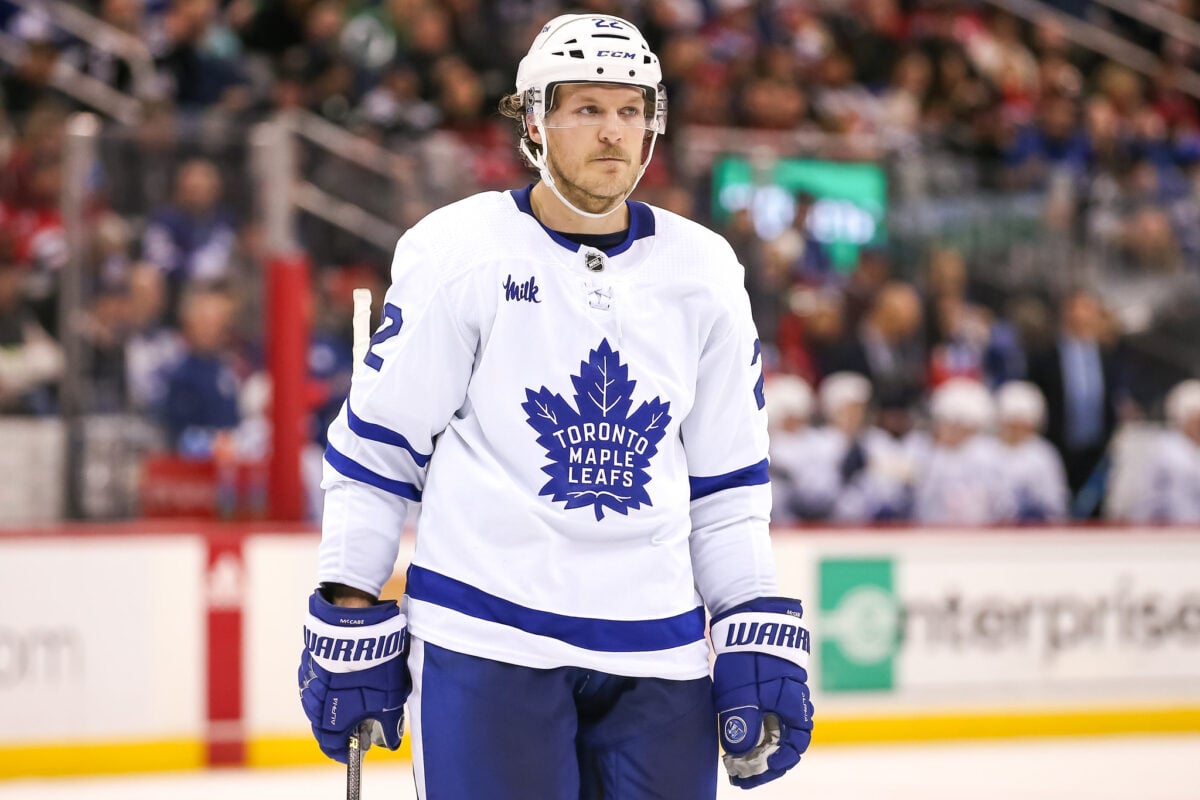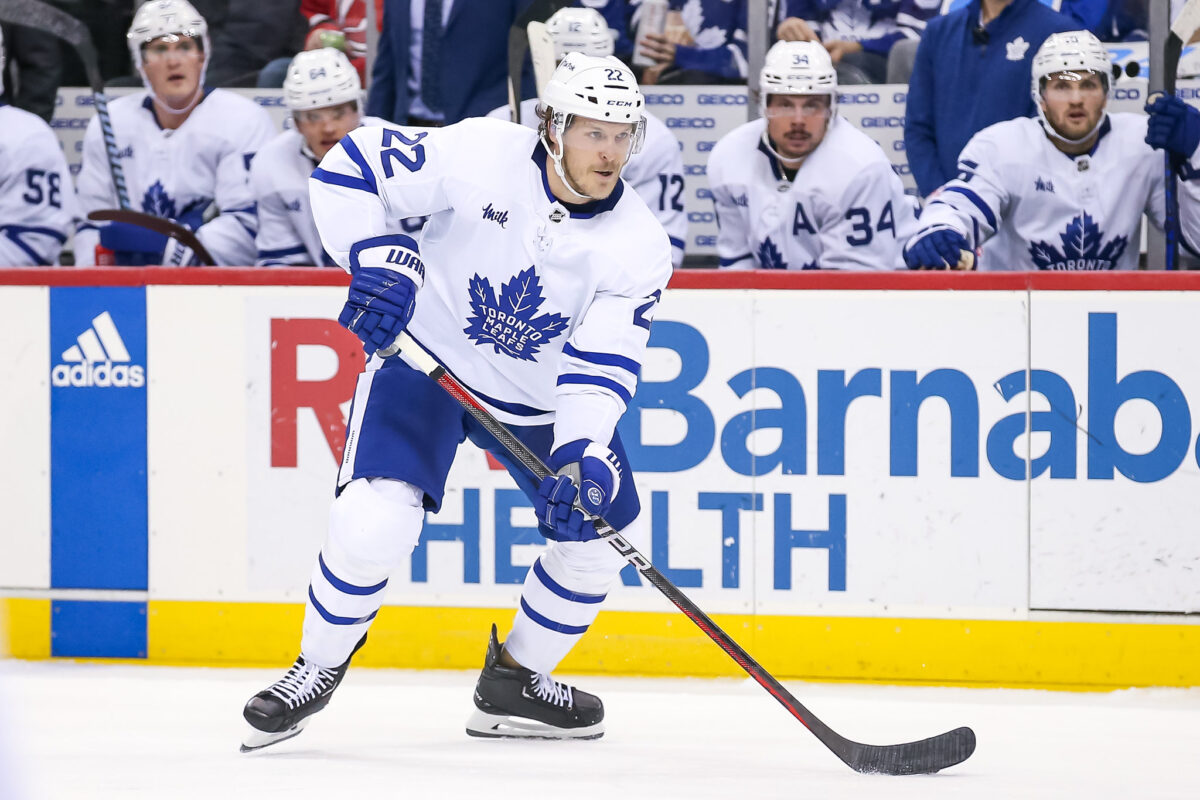The Toronto Maple Leafs secured a dramatic overtime win against the Philadelphia Flyers on Sunday (Jan. 5). However, the celebration was marred by an injury to Jake McCabe. While some injuries in hockey result from accidents – of all sorts, because of the speed and natural danger caused by living on the edge (pun intended), to a point, this injury was self-inflicted. At least it didn’t have to happen.
After heavyweight Garnet Hathaway crashed into Maple Leafs goalie Dennis Hildeby, McCabe jumped in to support his young teammate. One punch later, McCabe’s head crashed to the ice. The tilt was over quickly, but the effects might last for a while.
McCabe’s Lost Fight Was a Costly Part of His Team’s Win
Known for his warrior mentality and willingness to stand up for his teammates, McCabe once again put his body on the line for his team. But should he have? What will the cost to the team be?
Related: Toronto Marlies’ 3 Stars for December 2024
The Maple Leafs skated away with another win thanks to overtime heroics by Auston Matthews and Morgan Rielly. However, McCabe’s fight against a much tougher opponent will overshadow the game. The warrior defenceman, who has been a critical part of the Maple Leafs blue line’s recent success, was left wobbly after the fight. As a fan watching the game, you can’t help but be reminded of McCabe’s recent history with concussions.

In the short term, how many games will he miss? In the long term, what concerns does McCabe’s injury raise about the sustainability of his physical style of play? On Sunday, McCabe was true to form. He stepped in to defend his team’s honour. But the fight quickly went downhill. And, when his head hit the ice, he felt the worst of it.
The Double-Edged Sword of Grit
Fans often cheer when players like McCabe drop the gloves. There’s a visceral, emotional reaction that electrifies a crowd and rallies a team. But there’s a growing ambivalence among some Maple Leafs fans regarding fights like this – or any other. On the one hand, it’s easy to admire McCabe’s courage and loyalty; on the other, logic suggests long-term risks are possible – and with McCabe, even probable.
Related: NHL Rumors: Canucks, Canadiens, Senators, Maple Leafs
While it’s impossible not to respect McCabe’s heart, at what point should logic take over? Pragmatics ask if fighting is worth it if the team loses a crucial player for weeks—or worse—for a career. The defenceman McCabe replaced was Jake Muzzin. Muzzin’s career was cut short due to consistent concussions and, finally, a cervical spine injury. He wasn’t necessarily injured fighting, but the results were career-ending.
Players like McCabe walk a fine line. Their grit and physicality make them indispensable, but that same edge can lead to dangerous decisions. The stakes are even higher for McCabe. He’s not a newbie to head injuries.
When the Risks Outweigh the Reward
McCabe isn’t an enforcer by skillset. He’s physical in laying hits, but as a fighter, he’s not. But he is one of the Maple Leafs’ top-pairing defencemen, counted on to log heavy minutes against the league’s best forwards. Every fight he engages in carries the risk of injury—not just to himself but to the team’s chances of winning.

The McCabe incident is a stark reminder of the reality of fighting. Even for a game or two, missing him forces the Maple Leafs to lean on a thinner and less experienced defensive group.
Fans’ Changing Relationship with Fighting
The NHL’s culture around fighting has evolved over the years. While it remains a part of the game, many question its place, especially when it involves players like McCabe, who aren’t natural fighters. Don’t you gotta wonder how conflicted head coach Craig Berube is watching, wondering, and remembering his own career? He was a depth player and fighter during his career. Now he’s lost a key to his winning team because of a fight that didn’t have to happen.
Related: How Jake McCabe Elevates the Toronto Maple Leafs’ Blue Line
There’s also a growing awareness of the long-term consequences of repeated head injuries. Concussions are no longer seen as minor setbacks but as potentially career-altering events. For a fan like myself who wants the Maple Leafs to make a deep playoff run, watching McCabe engage in risky fights feels like a worthless gamble.
Is McCabe’s Concussion a Lesson in Restraint?
For McCabe and the Maple Leafs, the path forward may involve redefining roles and setting boundaries. While physicality and toughness are essential, they must be channeled in ways that don’t jeopardize the team’s success. Coaches (like Berube) might need to stress the importance of staying on the ice over making a statement. And McCabe, for all his heart, might have to learn to pick his battles more carefully—both for his own sake and for the team’s.
McCabe’s fighting instincts make him a fan favourite and raise provocative questions. How can the Maple Leafs harness his grit without risking his health? Should Blue & White Nation fans tone down and replace their admiration for his courage with their concerns for his well-being?
These questions will loom large as the Maple Leafs push toward the playoffs. For now, the hope is that McCabe hasn’t suffered the kind of concussion that will cost him a career or his health later in life. At some point, the warrior mentality that propels NHL players into illogical situations can be tempered by restraint.
McCabe is a cornerstone of the Maple Leafs’ defence when he’s on the ice. Right now, it looks like he won’t be any time soon. On Monday (Jan. 6), the team placed him on the injured reserved list.
